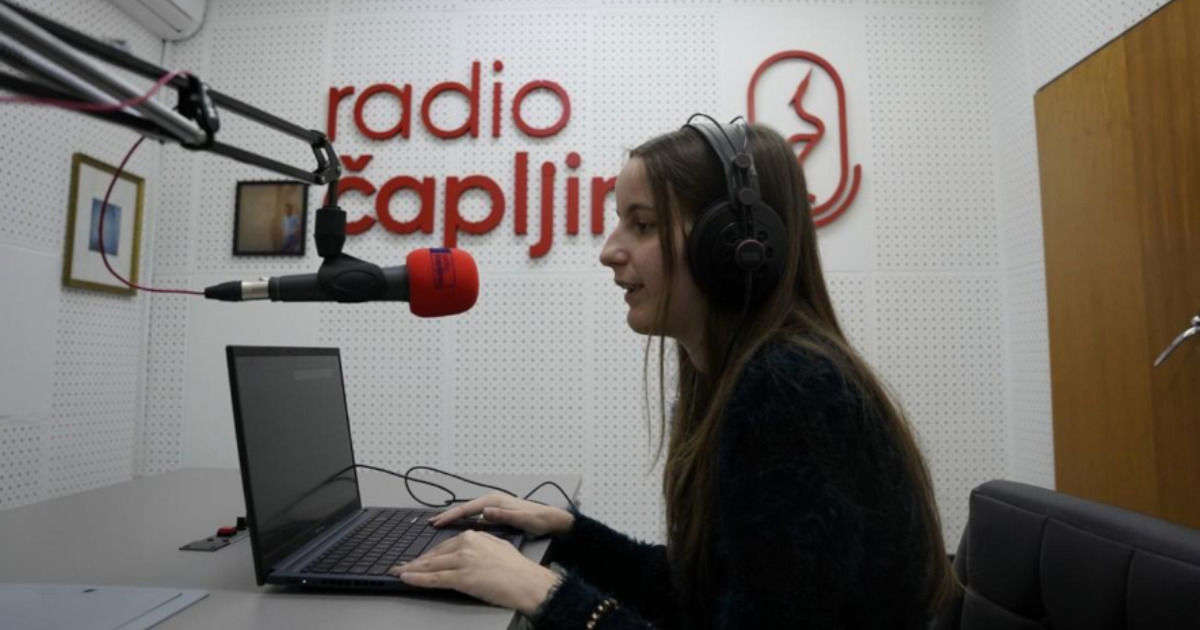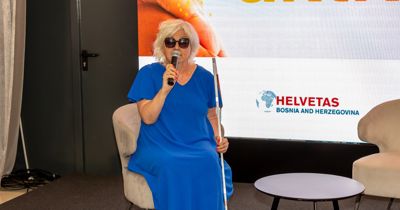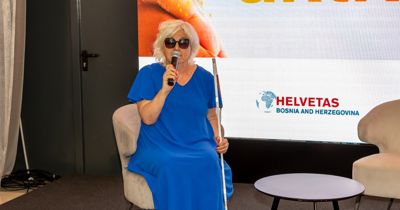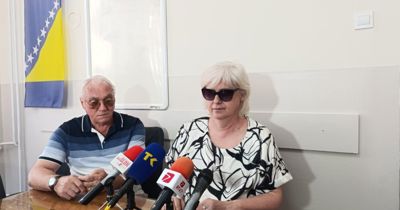
Martina Stanić, a 30-year-old journalism graduate, has been working as a journalist and radio host at Radio Čapljina for nearly six months. None of this would be unusual - if Martina weren't blind.
Despite numerous administrative challenges and obstacles they managed to overcome, the director of Radio Čapljina, Mile Limov, says that a law needs to be created and adopted to provide employment benefits for civilians with disabilities: “It would be good if such a law gave employment priority to people with disabilities in the public sector, as their greatest chance of employment lies precisely in the public sector. Within their abilities, every person with a disability could contribute significantly to the community and feel useful and fulfilled”, explains Limov. Martina, meanwhile, is one of the few blind people in our country who has been lucky enough to see her dream come true and start working in a profession she loves. “It was challenging, but it's important to fight and not give up. We have to do our part, because nothing will come on its own. If we want to achieve something, we must take the first step ourselves. It's important to tell someone we trust what we want and what our needs are. That person might not always be the one to help us directly, but they can point us to someone who can”, says Martina Stanić. Confident and ready to move forward with determination, embracing new knowledge and experiences, Martina believes that hard work always pays off and that one should never give up. In order for her to do the job she loves today, Radio Čapljina had to adjust the working conditions to make it easier for Martina and allow her to perform her tasks as smoothly as possible. While her colleagues assist her with certain duties, Martina completes part of the work independently. “Martina is an excellent example for all other people with disabilities - especially young people - that it's worth investing in yourself and working hard, getting an education and training in order to pave the way to employment”. When people saw that Martina had been hired, the director of Radio Čapljina was contacted by the Center for Children and Youth with Special Needs “Los Rosales” from Mostar, who offered their support. As a result, Martina now has two assistants who help her with getting to and from work.
According to the Union of the Blind of the Federation of Bosnia and Herzegovina, there are over 2,000 blind and visually impaired individuals in that entity who face a range of serious daily challenges - among them, access to essential assistive devices. One of the biggest issues lies in the fact that the healthcare sector is under the jurisdiction of individual cantons, meaning that not all blind and visually impaired people have equal rights, as regulations are not harmonized and vary from one canton to another. This inequality in access to assistive devices across the Federation of BiH directly affects the quality of life for these individuals. For this reason, the Association of Visually Impaired Citizens of Tuzla, the Association of Blind Citizens of Gračanica, the Association of Blind Citizens of the Una-Sana Canton, and the Association of Blind Persons of the Herzegovina-Neretva Canton, with the support of the PRAGG project, have launched the campaign "Improving the Independence of Blind Persons Through Better Access to Assistive Devices". These associations advocate for the establishment of equal rights to assistive devices for blind and visually impaired people. They emphasize the need to include priority assistive devices for blind and visually impaired individuals on cantonal orthopedic aid lists and stress that these essential tools must consistently remain on those lists. The associations argue that these aids are not a luxury, but a fundamental necessity for everyday life. Specifically, the organizations list the following as essential devices that should be included: the white cane, talking wristwatch, Braille wristwatch, protective glasses, ocular prostheses, contact lenses for individuals with high diopters who cannot wear glasses, thermometer, talking blood pressure monitor, talking glucose meter, screen reader software for desktops/laptops, Perkins Brailler, and electronic note-taker.
Another major issue is the disparity in availability of assistive devices across the country, as well as their high costs. Most of these devices are neither manufactured nor sold in Bosnia and Herzegovina, leaving blind and visually impaired individuals to fend for themselves as best they can. A significant number of aids are ordered from abroad, but that brings a new problem: the lack of uniform rules for reimbursement. In many cases, health insurance funds do not even recognize foreign invoices for essential assistive devices. The Association of Visually Impaired Citizens of Tuzla emphasized: “As in many other areas, rights exist far more on paper than in practice - which brings no real benefit to blind individuals. Assistive devices are used in education, at work, and in everyday life. They help reduce dependence on family members and friends. In addition to advocating for equal rights to access assistive devices, we want to highlight the need to simplify the procedures for exercising these rights, as well as address the practical aspect - where and how to obtain the devices.”
The organizations emphasize the urgent need to address access to assistive devices through a systemic approach, stating that all blind and visually impaired individuals should have equal rights. “We especially stress the importance of ensuring that these priority assistive devices are always included on the orthopedic aid list, as they are essential for the daily functioning of blind and visually impaired people. Without access to basic assistive devices, a blind person is excluded, dependent, and left at the mercy of family and friends - while human dignity and the inclusion our society strives for are truly priceless”, stated the Association of Visually Impaired Citizens of Tuzla.
However, there are signs that this issue may soon be resolved - at least in Tuzla. Recently, during a meeting with representatives of the Association of Visually Impaired Citizens of Tuzla, the Minister of Health of Tuzla Canton, Sušanka Bećirović, emphasized that both the Ministry of Health and the Health Insurance Fund of Tuzla Canton are aware of the needs and challenges faced by blind and visually impaired individuals. She stated that they will do everything they can to improve their quality of life. For blind and visually impaired individuals, assistive devices are essential not only in education and the workplace, but also in everyday life, as they reduce dependence on family members and friends. Their quality of life is also affected by the currently complicated procedures, which often discourage them from applying for their right to obtain these devices.
If the relevant institutions in Tuzla Canton truly recognize the importance of the initiative advocated by blind and visually impaired individuals, there is hope that other cantons will follow the same path. In addition to improving access to assistive devices, efforts should also be made to simplify legal procedures related to employment - so that individuals like Martina, from the beginning of our story, are no longer the exception, but the norm.







